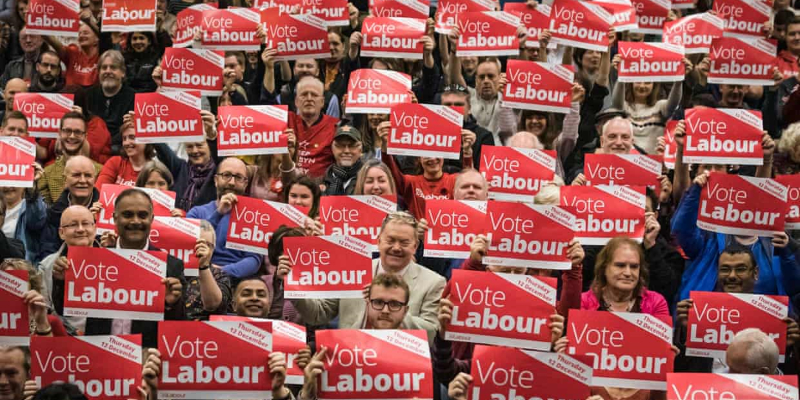The Labour left is still clutching at unity and refusing to face up to defeat. Derek James looks at the sorry results
The smell of decay and disintegration that has hung over the Labour left since the defeat of Jeremy Corbyn has only got stronger since last month’s party conference. Although some on the left have tried to spin the conference votes on Israel/Palestine, Aukus and the Green New Deal as victories, the truth is that Sir Keir and the Labour right are now in complete control of both the party machine and policy, and can safely ignore such left votes.
Taking some small comfort from passing resolutions is understandable, given the continuing dominance of the right, but it really does not do anybody any favours to pretend that the Labour left is in any state to fight back against Starmer. As the party continues to haemorrhage members, the Labour left simply does not have the numbers to effectively fight back, but – most importantly – it does not have either the strategy or the coherent politics to resist.
If we are going to build an authentic, militant left in the Labour Party, we have to tell the truth, not tell ourselves fairy stories. So, despite attempts to talk up the continuing strength of the left in the Constituency Labour Parties, it is plain that Corbynism cannot be revived: we have to be honest and admit that its moment has passed, and that no amount of wishing it back into existence or hoping that the king over the water will return to lead us, will bring it back to life again.
The Socialist Campaign Group of MPs and the Momentum leadership constitute simply the official, licensed left, which can be relied on to say nothing and do even less in the face of the witch-hunt and the proscriptions against the left as a whole. A combination of careerist opportunism and a political ‘strategy’ that prizes party unity and the election of a Labour government above all else means that these ‘leftwingers’ will continue to keep their heads down and accommodate to the Labour right on every occasion. They are wedded to the idea that any Labour government, no matter how rightwing and pro-capitalist, is better than the Tories and that ‘socialism’ can be delivered incrementally through a series of left Labour governments.
The latest incarnation of this tendency is Labour Left For Socialism – primarily an initiative of left trade union bureaucrats and assorted hangers-on, which has distanced itself from proscribed groups, such as Labour Against the Witchhunt, despite its verbal opposition to bans and proscriptions. Like the official left as a whole, there they stand: they can do no other; compromise and subordination to the pro-capitalist leadership are in their very DNA.
If the official Labour left has shown its true colours, what of the various groups of activists that have arisen to try to rally the left in the aftermath of the defeat of Corbynism? Although made up of genuine and committed comrades, the discussions within groups such as the Labour Left Alliance, Labour in Exile Network and LAW show that many comrades still have not really come to terms with why Corbynism failed and the nature of the current moment.
Amidst the rather contradictory trends and moods expressed during the online meetings since the conference, two broad currents can be discerned: those comrades who cling on to the glory days of Corbynism and seek to revive it through ‘grassroots campaigning’ against austerity or in defence of the NHS; as opposed to those who either want to form a new party immediately or believe we are already in a transitional phase in which such a party is in the process of being formed. Chris Williamson’s Resist is just the latest such attempt at a new direction and if, as seems likely, it takes the form of a broad left amalgam of the lowest common denominator or an unprincipled popular front, it too will follow Respect, Left Unity, and the Scottish Socialist Party into the dustbin of history.[1] Repeating the mistakes of these failed left parties of the past is no answer. But neither is simply recreating a Labour Party mark two, as the Trade Unionist and Socialist Coalition has so lamentably failed to do.
Socialist Appeal
What is lacking in both positions is a clear understanding of the nature of the Labour Party, both as an historical formation and in its contemporary form. Supporters of Labour Party Marxists have argued for a continuing strategic orientation towards the Labour Party, given its links with the trade unions, its base of support in the working class and the identification of the class with Labour as an electoral force. Given this, we cannot simply wish Labour away: our strategy must be to work through the Labour Party if we are to build a genuine Marxist party.
However, we have no illusions in the nature of the party or that, as presently constituted, it can be a ready-made instrument for achieving socialism. Labour remains a bourgeois workers’ party with a pro-capitalist leadership and working class base: both in organisational and political form it is committed to capitalism. Even under Corbyn’s ‘left’ leadership, the party’s manifesto in 2019 merely stood for a form of managed capitalism and the continuation of the constitutional status quo, not the self-emancipation of the working class and the socialist transformation of society.
In calling on Labour members to stay and fight, LPM is not simply repeating the mantra of Labour loyalists or arguing for staying put faute de mieux (for want of a better alternative). Our argument is that the fight for a Marxist party goes hand in hand with the demand for the refoundation of Labour as a united front of a special kind, open to all socialist and working class organisations. Moreover, given the nature of Labourism and its focus on purely electoral politics, if such a process is to be successful, it cannot be simply generated spontaneously or organically within the Labour Party itself. The history of the party from its very foundation in 1900 shows that such a transformation requires the development of a hegemonic Marxist party and a revolutionary programme that can act externally as a galvanising force and a pole of attraction for the inchoate Labour left.
Debating this strategy is now vital for the genuine left, both within and without the Labour Party. In particular, it is a question that Socialist Appeal supporters are now facing, as they suffer one expulsion from the party after another following their proscription by Labour’s national executive committee. We agree with them that we cannot simply ignore Labour or abandon the fight within the party. What about this argument?
What is needed is a powerful Marxist tendency, to provide a genuine, bold strategy to defeat the right. Only the forces of Marxism can provide the necessary backbone for the left. We fully understand that there can be no compromise with capitalism or their rightwing agents. We have no truck with patching up capitalism. We stand for revolutionary change in society; for the abolition of capitalist rule.[2]
Despite this apparent rousing call to arms, Socialist Appeal has not actually had a Marxist strategy towards Labour at all. In reality its comrades have been content to act as Labour loyalists, arguing that their rather economistic version of ‘Marxism’ is fully in accord with the old, Fabian-inspired 1918 clause four. In framing its politics around the election of a Labour government committed to a socialist programme, Socialist Appeal clearly stays within the framework of ‘parliamentary socialism’, with politics that are simply a logical extension of existing left reformism.
Moreover, although sharply critical of the current state of the Labour left, Socialist Appeal’s own politics cannot explain the structural reasons why the Labour left continues to hang on to the coat-tails of the right and is thus ultimately tied to the capitalist class. So, rather than analysing the left’s failure to overthrow the right as an inevitable result of their reformist politics and electoralism, the surrender of the left is merely attributed to an inexplicable unwillingness to fight and vague “political weakness”.[3]
Until we seriously explain why Corbynism failed and analyse how the Labour left continues to subordinate itself in practice to capitalism, we are doomed to simply repeat the tried-and-failed politics of the past. And that is not going to take us very far forward at all, is it?
Notes
[1] ‘Unity without principle’ Weekly Worker October 21: www.weeklyworker.co.uk/worker/1368/unity-without-principle.
[2] R Sewell, ‘Where is Labour heading?’ Socialist Appeal October 15 2021.
[3] Ibid.


